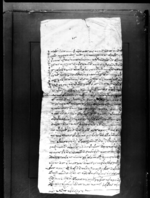A kabuliyata from Bharapuranātha Jogī to the Guṭhī Bandobasta Aḍḍā re his appointment as the new abbot of the monastery of Gorakhanātha (VS 1978)
ID: K_0252_0022
Edited and
translated by Astrid Zotter and Christof Zotter
in collaboration with
Pabitra Bajracharya
Created: 2021-02-11;
Last modified: 2022-11-11
For the metadata of the document, click here
The accompanying edition, translation/synopsis and/or commentary are available under the terms of the Creative Commons Attribution-ShareAlike 4.0 International License
Abstract
In this deed of acceptance (kabuliyata) submitted to the Guṭhī Bandobasta Aḍḍā, Pīramahanta Bharapuranātha, the new abbot of the monastery of Gorakhanātha at Mṛgasthalī, declares that he will perform the tasks of the monastery as usual, including its regular and occasional rituals, and will be responsible for the operation and maintenance of the monastery's property.Diplomatic edition
[1r]
1श्री:\1⟪ड∙षपुरुषोतंप्रसाद⟫181२८1सहिपिरमहंतभर्पुर्नाथजीकाठ्माडु1लीषीतं∙दैलेष∙ज्वालाजी∙मठ्कोजनम्∙हाल्∙काठ्माडौ∙वस्नेवर्ष∙४०को∙पी2रमहंतभरपुरनाथ∙जोगीआगे∙मृगस्थलीगोरषनाथका∙पीरमहंत∙परम
3हंसनाथ∙मरीषालीभय़ाकाठाऊमा७८साल्आश्वीं१५गते६कादीन∙
4राजवाट
5तराषीसकेकोहुनालेभोलीदेषीघटस्थापना∙गरी∙नवरात्रीकोकामचला
6ऊनुपर्नेभय़ाकोहुनालेनीजलाईवाहाल्गर्नालाई∙धीलागर्न∙नहुनेहुंदा
7सनड्∙हुनढीलाभयेतापनी∙नीज∙भरपुरनाथ∙लाईवाहालीपुर्जीआजै
8गरीदी∙वुझवुझारथकोकां∙लाई२।४दींढीलाभयेतापनी∙भोलीडेषी
9कोकांलाई[?]ड्काऊनहुनेगरीजोगर्नुपर्नेवंदोवस्तस्मेतमीलाई∙पठाई
10[?]भनीश्रीवडागुरुज्युवाटमर्जीभय़ाकोहुनालेलेषनेकांभय़ाकोछतस
11र्थ∙स्ववमोजींगर्नेकांभय़ावढीयाहोलाकांअड्काऊहुननपाव़सभं
12ने७८साल्आश्वीं१६गते७माश्री६वडागुरुज्युकातहवील्वाटयेसअडा
13कानाऊमालेषौट्भैआय़ाकोहुनाले∙सनदभै∙आय़ापछी∙सोवमोजींको
14कवुलीयेत∙स्मेतजोहुनेहुनेछतपनी∙हालै∙वाहालगरीकांचलाऊना
15लाईकांचलाऊनालाई∙कवुलीयेतगरीडेऊभनीसोधनीभय़ाकोमा
16सोमठ्मा∙भोली∙आश्वीं१७गते१कादीन∙दसै∙कोघटस्थापनास्मे
17तकोकांगर्नुपर्नेहुनालेभोलीवेहानैमठ्मावाहाल्गरी∙सावीकडरी
18चलीआय़ाकोलगतडांसीलापत्र∙सनड्पंजीलवमोजीं∙नीत्येपर्वस्मे
19तकाकांकाज्चलाउनेरअैंसव़ाल्∙वमोजीं∙मोहीरैतीलाईवढीटंटा
20दुषपीरनलगाईतर्तहसीलगर्नेस्मेतकांगरुंला∙सोमृगस्थलीमठ्रसो
21मठ्तालुक∙ईन्द्रचोककाठ्माडौस्मेतठाऊठाऊको∙मालमत्तानगडीजींसी
22जोभय़ाकोसावीकका∙पालाकोवुझीलीय़ावमोजींरमेरापालामाथप
23आय़ाकोस्मेत∙हीफाजतसाथनोक्सानहुननपाऊनेपरीवंधपुर्याईरा
24षुंला∙मठ्घरभी⟪ट⟫केवी∙ग्रेकोमर्मतगरीतय़ारीराषुंला∙लेषीय़ावमो
25जींनगरी∙धर्मलोप∙गरेको:वा∙मठ्कोकांमाल्वेहीसावभंगजत्रतत्र∙
26गरेकोस्मेतठहर्योभने∙अैंसव़ालसनड्वमोजींवुझाऊला∙भनीकवुलीयेत
27लेषी∙
28साल∙आश्वीण१६गतेरोज१श्भ्म्¯¯¯¯¯¯ ¯¯¯¯¯¯¯¯¯
Translation
[1r]
[Invocatio:]
[In the upper left corner:]
81
[In the upper margin:]
da. kha.2 Puruṣotaṃ Prasāda
283
[In the left margin:]
Signature: PīramahantaBharpurnāthajī, Kathmandu (text: Kāṭhmāḍu)
[Main text:]
Written by Pīramahanta Bharapuranātha Jogī, born in Jvālājī Maṭha, Dailekha, now living at Kathmandu (text: Kāṭhmāḍau), aged 40
Āge: "The task of writing [to your office] has arisen because there is an order (marjī) by the Śrī Baḍā Gurujyu stating: 'The pīramahanta of the Gorakhanātha [monastery] at Mṛgasthalī, Paramahaṃsanātha, having died, Śrī 3 Mahārāja appointed Bharapuranātha to the vacant office, and also validated [the appointment], on Friday, the 15th solar day (gate) of the month of Āśvina in the [Vikrama era] year [19]78. Given that the said [Bharapūranātha] has already submitted [1] rupee,4 and as the ghaṭasthāpanā [and other] Navarātrī rituals need to be performed from tomorrow on, issue a provisional appointment letter (bahālī purjī) today, even if the prime minister's letter of appointment (sanada) is delayed, so that the appointment of the said person is not delayed further. Even if matters related to the transfer of office (bujhabujhāratha) may be 2 to 4 days late, make the necessary arrangements for what needs to be done and have [the provisional appointment letter] sent so that the [ritual] tasks [to be performed] from tomorrow on are not obstructed.' It would be good, therefore, if the matter is attended to accordingly. May the [ritual] tasks not be obstructed." As on Saturday, the 16th solar day of the month of Āśvina a written note (lekhauṭ) from the accounts office (tahabila) of Śrī 6 Baḍā Gurujyu was addressed to your office stating thus,5 and as there has been an enquiry (sodhanī) [sent by your office to me] stating: "After the sanada is issued together with the deed of acceptance (kabuliyata) in accordance with it, what is to be [done] will be [done]. Still, in order to get on with the task of appointing [a new pīramahanta], immediately write a deed of acceptance", I am writing [this] deed of acceptance (kabuliyata) and submitting it to the Guṭhī Bandobasta Aḍḍā under Śrī 5 Sarkāra, stating: "As in this monastery (maṭha) tomorrow, Sunday, the 17th solar day of the month of Āśvina, the rituals of Dasaĩ with the ghaṭasthāpanā need to be performed, I shall, after being appointed [to the post of pīramahanta] in the maṭha tomorrow morning, perform the work [of the maṭha] related to carrying out the regular and festival rituals and other business (kāmakāja) according to what has been determined in the records (lagata), deeds of gift (dāna[patra]), stone inscriptions (śilāpatra), prime ministerial decrees (sanada) and registers (paṃjīla)6 and I shall also collect the revenue and so on7 in accordance with the laws (ain) and directives (savāla), without obliging the tenants and ryots to [pay] more [or] inflicting botheration, distress and pain on [them]. I shall see strictly to it that no harm comes to whatever cash or material items this Mṛgasthalī monastery has, together with the proprietary rights (tāluka) the monastery possesses at different places, including at Indracoka [in] Kathmandu, according to what has been understood as its possessions in previous terms of office along with what is added during my term of office. I shall make provisions to repair what collapses8 or breaks in the monastery building. If it is found that I do not act in accordance with what is written [here], so that rightfulness (dharma) is made to perish or that countless monastery-related tasks and things are broken or thrown into disarray, I shall provide compensation in accordance with the laws (ain), directives (savāla) and decrees (sanada)."
Sunday,9 the 16th solar day (gate) of the month of Āśvina in the [Vikrama] era year 1978 (1 October 1921). Auspiciousness.
Commentary
This document concerns the succession of Bharapuranātha to the office of pīramahanta of the Nātha tradition of Mṛgasthalī following the death of his predecessor, Paramahaṃsanātha. As the appointment process leading to the full appointment papers, including a sanada from the prime minister, was still ongoing, a provisional appointment was fast-tracked in order to ensure that the autumnal Dasaĩ rituals, starting the next day, would be performed properly. The present document is the deed of acceptance (kabuliyata) by Bharapuranātha that, according to its text, was asked for, probably by the Guṭhī Bandobasta Aḍḍā itself, to which office it was submitted. The kabuliyata is only one of several documents that were all issued on the same day (or are at least all dated the same day) by several offices and actors. It quotes one of these, an order by the Baḍā Gurujyu's account office verbatim (K_0252_0021) and itself is quoted by the bahālī purjī issued by the Guṭhī Bandobasta Aḍḍā on the very same day the request was received (K_0054_0053, K_0177_0004). For further related documents and more on this case, see the Commentary to K_0252_0018.

